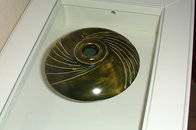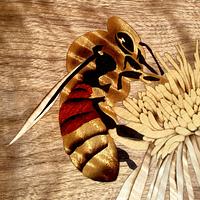
Manitario
in almost 12 years
What is your go-to Finish
If you had to only use one finish for the rest of your woodworking life, what would you use, and why?
Finishing ranges from the extremely complex to the very simple, and I’m sure that libraries worth of books and articles have been devoted to finishing and different “recipes”. I suspect though that most of us have a few “go-to” finishes that we use for most projects despite the variety available.
Personally, I’ve tried a wide variety of different finishes but I keep coming back to a few favourites, depending on what wear and tear the project will experience. I use Minwax “tung oil” on a disproportionate number of my projects; I love the warm luster that it gives to the wood, and if the project needs more protection eg. a table, it is easily coated with wipe on poly.
What is your go-to finish?
Rob, Sault Ste. Marie, Ontario
22 Replies
Danish oil! Love that stuff.
Losing fingers since 1969
I guess I use what I think will work best depending on the project ,but many times I will use general finishes dye/stain and a water base top coat.
woodworking classes, custom furniture maker
General Finishes gel stains and Jeff’s finishing wax. Great stuff.
Jack
Linseed oil: Linseed oil : Linseed oil: Tung oil: Tung oil: Total 5 coats. Takes a lot of time but worth it to me.
Madts.
P.S. Inside only. Outside in Texas: Concrete. The only thing that will stand up the the sun!
Tor and Odin are the greatest of gods.
Anything interior that must be protected I use a water based nitro cellulose called KTM9 for a high gloss that is polish able with a buffer, or as is for a satin look. It cures to an unbelievably hard finish.
CHRIS, Charlottetown PEI Canada. Anytime you can repurpose, reuse, or recycle, everyone wins!
For the things I make these days there is only one go to…….. French polish. It isn’t for every project but in the last few years it has gone on almost everything I have made. Second choice for better durability is hardwax oil. The brand I use in Canada is Saicos.
In the USA I use Fiddes. The stuff is amazing but FP is still my go-to.
The early bird gets the worm but its the second mouse that gets the cheese.
boiled linseed oil , , I like the fact that I can refinish every so often . or polyurethane high gloss.
Wheaties
I love using tung oil!
Or shold I say, a thinner version of a finish
Minwax calls Tung Oil, but actually has
NO tung oil in it!
I like using it though, its thin enough to
penetrate the wood on the first coat, and
is easily buffed to a shine,
Then I top it with Jeff Vanderburgs,
Bees wax and tung oil paste, the stuff is
fantastic!
You end up with a beautiful and water proof finish!!!
If you haven’t tried it Do!
You’ll like it more than your money!!!!
Steve Tow
Steve Tow
Well. I usually use blo thinned with white spirits but lately I’ve been poking around shellac.
I currently have an amazing elm board I’ve made into a “media” shelf (place to sit a sky cable box under a wall hung tv) but I’m panicking. I’ve never used elm before (dreadful, furry stuff) and I don’t want to colour or shade it, it’s so pretty as it is…I don’t know what to do.
I love the elm, btw, amazing colours and a wonderful surface after all the scraping.
but yeah, boiled linseed covers most things…bit of wax on top…
-- Alec (Friends call me Wolf, no idea why)
I’d hate to be tied to one finish, different situations call for different finishes. But i will say I use more oil base alkyd varnish than anything else. Since that’s getting nest to impossible to find (along with all oil based finishes in general) I’ll be switching to a waterborne once my stash is gone.
"I long for the day when coke was a cola and a joint was a bad place to be" Merle Haggartd
Depends on the project. But I like to finish the topcoat of with Howards Beeswax and Orange Oil.
interesting responses from everyone, seems like oil finishes predominate, but quite the variety. It’s funny that BLO or BLO based finishes still seem to be favourite. After several hundred years, linseed oil is still going strong.
Rob, Sault Ste. Marie, Ontario
My go to is Lacquer followed with beeswax. Quick to dry, easy to apply, and the beeswax leaves it silky smooth. I know it’s not the most durable, but it works on most of my projects. Like everyone else, if it needs a different finish, I’ll use a different finish. Meanwhile, my sprayer just sits in the cabinet ready and loaded with lacquer to be sprayed. If the tip gets a bit gummed up, just apply some thinner, and your good to go.
Sorry to be different but, my go to finish is a satin coat of poly. I am not a fan of high gloss, seems to me to take away the real beauty of the wood it’s self. Looking from the side angle all one sees is the glare, with satin, not so much. I love the durable protection poly gives. Just my input. Also most of the work has a stain of one color or another.
Jamesw
Most of my work requires a hard, durable finish so we primarily use satin conversion varnish. It’s virtually impervious, you can pour acetone on it with little effect.
Artisan Woodworks of Texas- www.awwtx.com
For me, it would be gloss poly. I could add oil to give it flex for exterior use. I could thin it and use it as a wipe on. I could add even more oil to increase penetration. I could buff it with rotten stone to bring it down to a satin.
I use a lot of different finishes, but my old standby is General Finishes Arm R Seal. It is fool proof, easy to apply and looks great.
Bondo Gaposis
Most of my projects are rather small and I use a variety of finishes depending on whether the item will be used and handled a lot or just for display.
One finish that I like for the former is oil based polyurethane, but with a little twist. I usually use 3 coats, sanding between and then sanding with say 600 grit on the topcoat followed by auto rubbing compound to make it silky smooth and slightly more glossy. It is wonderful to the touch and looks amazing. This is approximately what it looks like.

Mike, an American living in Norway
Mike, if you need to polish some metal, try McGuires Mag Polish. Then, since you have it already, try a little on a disposable project and see what you think. Like automotive polishing compound, it gives a finer finish.
Brian, don’t forget that most the so called Danish Oil finish is just thinned varnish or poly, just as Tung Oil Finish is usually boiled linseed oil with a little thinner and some resin to make a wipe on finish.
“Danish oil! Love that stuff.”























